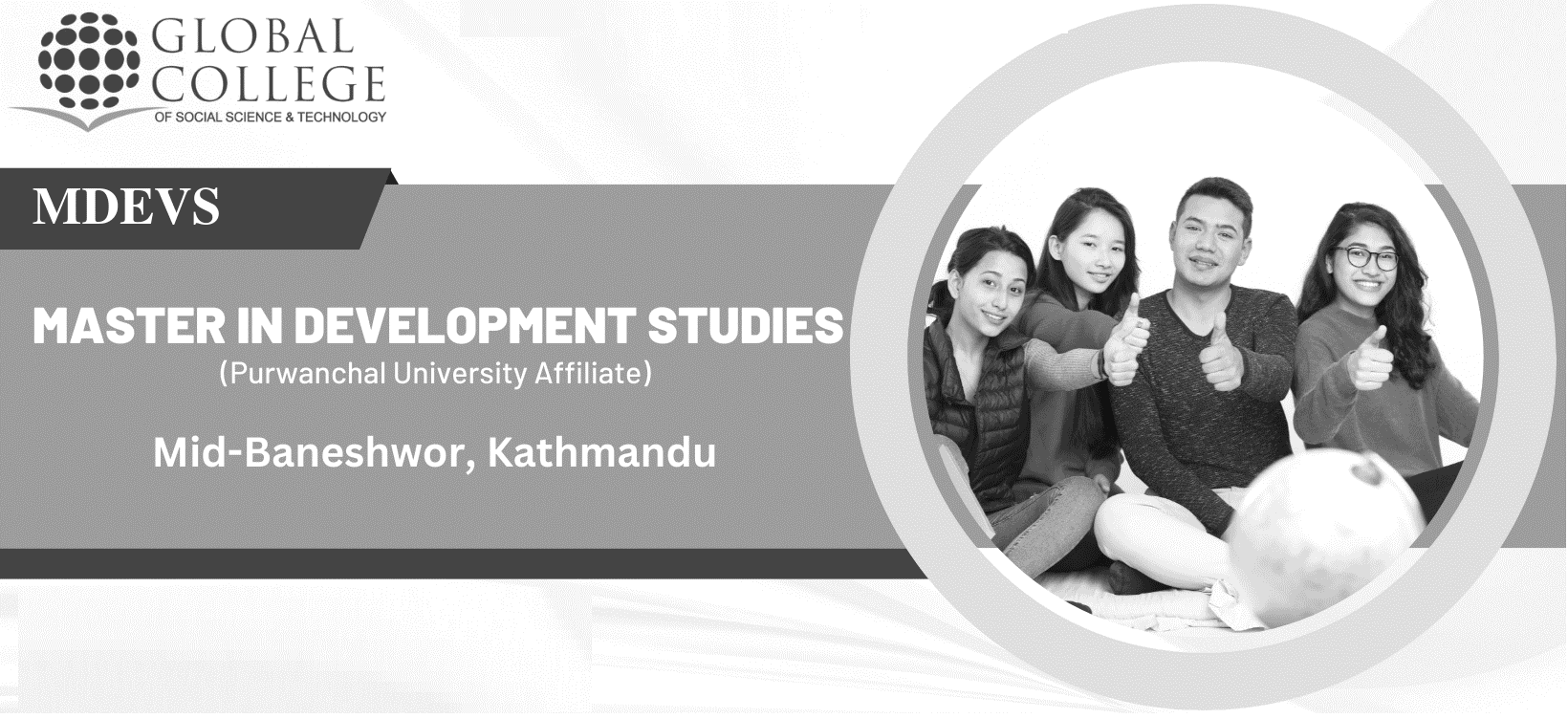Overview
Master in Development Studies (MDevS) at Global College of Social Science and Technology
Global College of Social Science and Technology (GCST), located in Mid-Baneshwor, Kathmandu, offers a two-year Master in Development Studies (MDevS) program affiliated with Purbanchal University. Since its inception in 2006, this program has remained focused on bridging the gap between theoretical learning and real-world application.
The course is structured to help students analyze development problems critically while also preparing them for practical engagement in diverse social, economic, and governance contexts. The college follows participatory learning approaches, ensuring that students stay closely connected to real-world field experiences.
Highlights
-
Program Duration: Two years (four semesters)
-
Affiliated to: Purbanchal University
-
Location: Mid-Baneshwor, Kathmandu
-
Total Seats: 33
-
Interdisciplinary approach
-
Regular fieldwork and case-based learning
-
Research-oriented curriculum
-
Focus on applied development studies

Curriculum Details
The MDevS curriculum combines foundational theory with practical components. Each semester includes one or more field visits, research assignments, and analytical tasks. Core subjects span:
-
Development Theory and Practice
-
Research Methods
-
Governance and Public Policy
-
Environment and Sustainable Development
-
Social Protection and Human Rights
-
Dissertation with field research
Objectives
-
Equip students with analytical tools to examine development challenges
-
Strengthen skills in research, communication, and evidence-based planning
-
Promote an understanding of social and economic disparities
-
Develop professionals for development-focused institutions
Scope
Graduates can explore roles in:
-
NGOs and INGOs
-
Government bodies (local, provincial, federal)
-
Academic institutions and research centers
-
Policy advisory organizations
-
Community development projects
Learning Outcomes
By the end of the program, students will be able to:
-
Analyze development issues using interdisciplinary perspectives
-
Conduct independent research using field-based evidence
-
Evaluate programs and policies within a socio-economic context
-
Write research papers, policy briefs, and development proposals
Skill Development Modules
-
Writing and presentation workshops
-
Research tools and data interpretation
-
Community engagement strategies
-
Group analysis and dialogue-based learning
Teaching Methodology
-
Seminar-style interactive classes
-
Case study and scenario-based teaching
-
Field exposure and reflective assignments
-
Individual and group presentations
Admission Requirements
-
Completion of a Bachelor’s degree in any relevant discipline
-
Academic eligibility as per Purbanchal University guidelines
-
Entrance exam and interview-based screening process
Career Opportunities
Graduates from GCST’s MDevS program work in:
-
Planning and monitoring roles in development organizations
-
Policy units and think tanks
-
Academic and teaching positions
-
Social enterprise and advocacy sectors
Scholarships and Financial Aid
The college offers limited scholarships:
-
Need-based and merit-based categories
-
Special consideration for students from remote regions
-
Support for underrepresented groups
Why Choose This Course?
-
Combines academic learning with community-level insight
-
Encourages participatory and reflective education
-
Taught by professionals experienced in both research and fieldwork
-
Accessible faculty support for academic development
Conclusion
The Master in Development Studies at GCST is a practice-oriented academic journey. It prepares students not just to understand development, but to work actively toward meaningful social progress. Through critical inquiry, field learning, and close mentorship, the course provides a solid foundation for careers in development work, policymaking, and academic research.
Contact Global College of Social Science and Technology's administrative office for detailed information on the Master in Development Studies (MDevS) course, including fees, scholarships, facilities, counseling, eligibility criteria, etc.

















